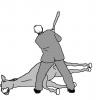Hi everyone.
My main problem is with verbal expression. I have trouble finding the right words to clearly and efficiently express my thoughts. Before I speak, it's as if the right words dangle in suspension as I struggle to grasp them in time to form my thoughts into concrete speech before the other person loses interest in what I have to say. I often stutter, stammer, mispronounce words, use the wrong words, e.g. "sesame" seed instead of "sunflower," speak slowly, get tongue-tied, and just generally suck at clearly conveying my thoughts. People have a hard time understanding what I'm trying to say.
Talking is physically exhausting for me. I know the content of what I want to say, but putting that into actual speech is mentally taxing for me. Is there a reason why this might be? Simply poor brain functioning or low intelligence? Mild aspergers?
I've toyed around with the idea that I'm low in acetylcholine, but I've read the book "The Edge Effect" and I actually resonate with the acetylcholine-dominant personality more than anything else. I'm an emotional person who loves listening to people and empathizing with them, and I primarily navigate my world through my intuition. However, the book argues that low acetylcholine tends to cause speech difficulties, e.g. trouble using the right words, etc., which can be a manifestation of varying degrees of dyslexia, aspergers, Alzheimers, etc.
So here's my predicament: Since I'm pretty sure I have an abundance of acetylcholine, taking Acetyl-based supplements to improve my speech won't be smart because it would further deplete my levels of serotonin, which I am definitely LOW in. In fact, I'm currently on a low dose SSRI for anxiety, and have found it to be tremendously life-changing.
So my question is, what can I do?
I'm very new to the world of neuroscience and brain health, so I'm trying to figure out how I can get my brain to do what I want it to do without screwing things up further, i.e. raising my acetylcholine levels whilst further depleting my serotonin supply or nullifying the effects of my SSRI medication.
I'd be a much more functional and happier person if i could speak more fluently, like others seem to do so effortlessly. Anyone with any ideas about how to achieve this end would be greatly appreciated. Thanks!
























































